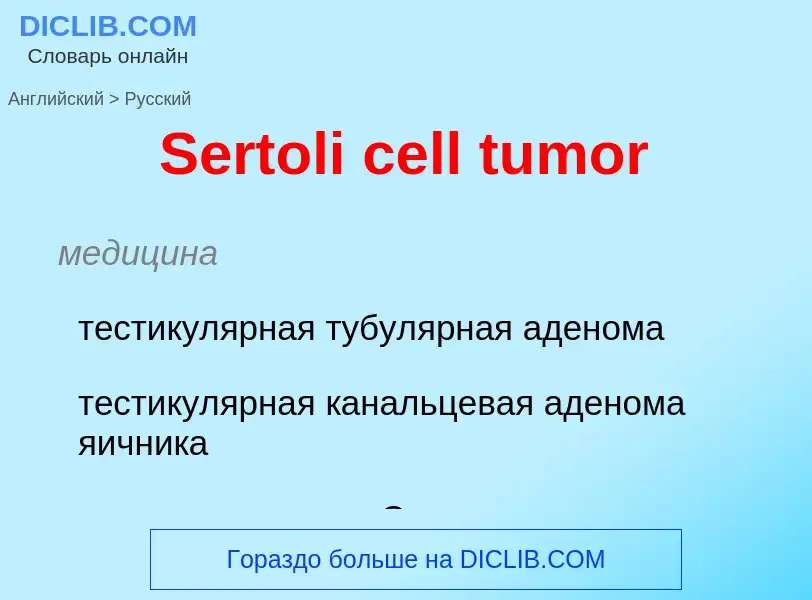Traducción y análisis de palabras por inteligencia artificial ChatGPT
En esta página puede obtener un análisis detallado de una palabra o frase, producido utilizando la mejor tecnología de inteligencia artificial hasta la fecha:
- cómo se usa la palabra
- frecuencia de uso
- se utiliza con más frecuencia en el habla oral o escrita
- opciones de traducción
- ejemplos de uso (varias frases con traducción)
- etimología
Sertoli cell tumor - traducción al ruso
медицина
тестикулярная тубулярная аденома
тестикулярная канальцевая аденома яичника
опухоль из клеток Сертоли
медицина
арренобластома
арренома
андробластома
маскулинома
опухоль из сертоли-лейдиговских клеток
медицина
арренобластома
арренома
аденома Пика
тестикулярная тубулярная аденома
тестикулярная канальцевая аденома яичника
андробластома
маскулинома
опухоль из клеток Сертоли
опухоль из сертоли-лейдиговских клеток
Definición
Wikipedia

Sertoli–Leydig cell tumour is a group of tumors composed of variable proportions of Sertoli cells, Leydig cells, and in the case of intermediate and poorly differentiated neoplasms, primitive gonadal stroma and sometimes heterologous elements.
Sertoli–Leydig cell tumour (a sex-cord stromal tumor), is a testosterone-secreting ovarian tumor and is a member of the sex cord-stromal tumour group of ovarian and testicular cancers. The tumour occurs in early adulthood (not seen in newborn), is rare, comprising less than 1% of testicular tumours. While the tumour can occur at any age, it occurs most often in young adults. Recent studies have shown that many cases of Sertoli–Leydig cell tumor of the ovary are caused by germline mutations in the DICER1 gene. These hereditary cases tend to be younger, often have a multinodular thyroid goiter and there may be a personal or family history of other rare tumors such as pleuropulmonary blastoma, Wilms tumor and cervical rhabdomyosarcoma.
Closely related terms include arrhenoblastoma and androblastoma. Both terms are classified under Sertoli–Leydig cell tumour in MeSH.


![High magnification [[micrograph]] of a Leydig cell tumour. [[H&E stain]]. High magnification [[micrograph]] of a Leydig cell tumour. [[H&E stain]].](https://commons.wikimedia.org/wiki/Special:FilePath/Leydig cell tumour3.jpg?width=200)
![High magnification [[micrograph]] of a [[Sertoli cell tumour]]. [[H&E stain]]. High magnification [[micrograph]] of a [[Sertoli cell tumour]]. [[H&E stain]].](https://commons.wikimedia.org/wiki/Special:FilePath/ Sertoli cell tumour high mag.jpg?width=200)

![Micrograph of a [[Leydig cell tumour]] Micrograph of a [[Leydig cell tumour]]](https://commons.wikimedia.org/wiki/Special:FilePath/Leydig cell tumour2.jpg?width=200)
